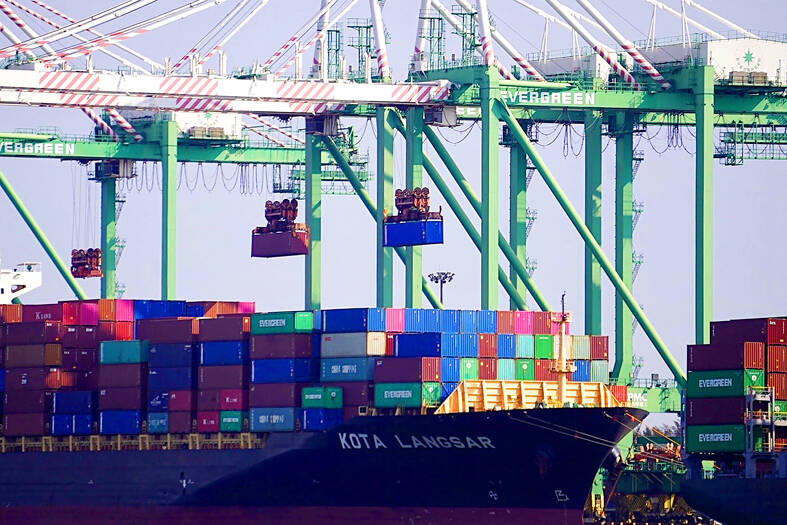Export orders dropped at the fastest pace in about three years at 6.3 percent annually to US$55.4 billion last month amid a deteriorating macroeconomy, the Ministry of Economic Affairs said yesterday.
The pace of decline topped the ministry’s expectation of an annual drop of 3.6 percent. On a monthly basis, orders fell 9.1 percent, the ministry said.
With external uncertainties — surging inflation, a global economic downturn and China’s “zero COVID” policy — continuing to weigh on demand, export orders are forecast to see a steeper decline of between 14.5 percent and 17.6 percent annually this month, the ministry said.

Photo: CNA
That would translate into orders of US$54 billion to US$56 billion and mark a third consecutive month of annual contraction, the ministry projected.
“There is a 50 percent chance that export orders for the full year would decline from last year,” Department of Statistics Director Huang Yu-ling (黃于玲) said by telephone.
“November’s performance is crucial. If the results come in closer to the high end of our forecast, there would be a smaller chance that they would dip into negative territory for the full year,” she said.
During the first 10 months of this year, export orders rose 4.4 percent annually to US$564.47 billion, ministry data showed.
Taiwan has not experienced a decline in annual export orders since 2019, when they shrank 5.3 percent, ministry data showed.
Last month, orders for electronics products expanded 9.6 percent annually to US$18.86 billion, driven by increasing demand for chips used in 5G-related applications, high-performance computing devices and automotive electronics.
RESTOCKING
Inventory restocking demand ahead of the year-end shopping sprees also helped, the ministry said.
On a monthly basis, orders for electronic goods slid 8.7 percent.
Orders for information and communications technology products edged down 0.3 percent annually and 9.4 percent monthly to US$18.45 billion, as demand weakened amid inventory adjustments in the supply chain, the ministry said.
Rising demand for newly launched smartphones and networking devices was offset by a decline in orders for notebook computers and graphic cards, it said.
Orders for optoelectronics, including flat-panel displays, dropped 43.4 percent annually and 13.2 percent monthly to US$1.47 billion last month due to sluggish demand for displays used in TVs and notebook computers, as well as lower average selling prices, the ministry said.
Base metal orders plunged 35.6 percent annually and 6 percent monthly to US$2.1 billion on the back of to weak demand for steel products, while orders for machine tools fell 25.3 percent annually and 12.5 percent monthly to US$1.69 billion, as manufacturers became more conservative about capital spending.
Inventory adjustments also caused orders for plastic products to plummet 38.3 percent annually and 8.5 percent monthly to US$1.62 billion, ministry data showed.
Petrochemical products also fell 31 percent annually and 9.5 percent monthly to US$1.51 billion, the data showed.

Nvidia Corp chief executive officer Jensen Huang (黃仁勳) on Monday introduced the company’s latest supercomputer platform, featuring six new chips made by Taiwan Semiconductor Manufacturing Co (TSMC, 台積電), saying that it is now “in full production.” “If Vera Rubin is going to be in time for this year, it must be in production by now, and so, today I can tell you that Vera Rubin is in full production,” Huang said during his keynote speech at CES in Las Vegas. The rollout of six concurrent chips for Vera Rubin — the company’s next-generation artificial intelligence (AI) computing platform — marks a strategic

Enhanced tax credits that have helped reduce the cost of health insurance for the vast majority of US Affordable Care Act enrollees expired on Jan.1, cementing higher health costs for millions of Americans at the start of the new year. Democrats forced a 43-day US government shutdown over the issue. Moderate Republicans called for a solution to save their political aspirations this year. US President Donald Trump floated a way out, only to back off after conservative backlash. In the end, no one’s efforts were enough to save the subsidies before their expiration date. A US House of Representatives vote

REVENUE PERFORMANCE: Cloud and network products, and electronic components saw strong increases, while smart consumer electronics and computing products fell Hon Hai Precision Industry Co (鴻海精密) yesterday posted 26.51 percent quarterly growth in revenue for last quarter to NT$2.6 trillion (US$82.44 billion), the strongest on record for the period and above expectations, but the company forecast a slight revenue dip this quarter due to seasonal factors. On an annual basis, revenue last quarter grew 22.07 percent, the company said. Analysts on average estimated about NT$2.4 trillion increase. Hon Hai, which assembles servers for Nvidia Corp and iPhones for Apple Inc, is expanding its capacity in the US, adding artificial intelligence (AI) server production in Wisconsin and Texas, where it operates established campuses. This

US President Donald Trump on Friday blocked US photonics firm HieFo Corp’s US$3 million acquisition of assets in New Jersey-based aerospace and defense specialist Emcore Corp, citing national security and China-related concerns. In an order released by the White House, Trump said HieFo was “controlled by a citizen of the People’s Republic of China” and that its 2024 acquisition of Emcore’s businesses led the US president to believe that it might “take action that threatens to impair the national security of the United States.” The order did not name the person or detail Trump’s concerns. “The Transaction is hereby prohibited,”